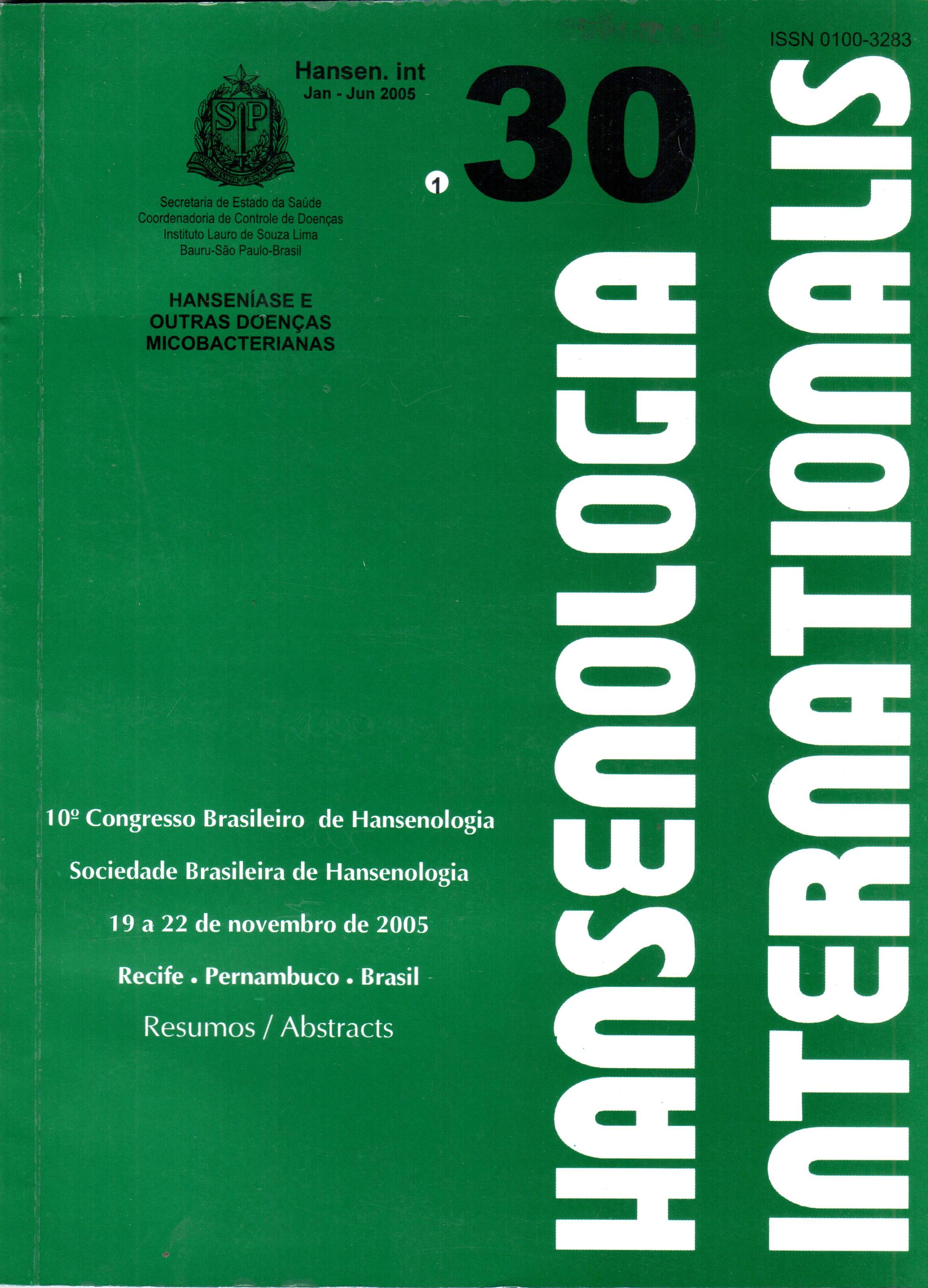Resumo
.
Referências
Becx-Bleumink M, Berhe D. Occurrence of reactions, their diagnosis and management in leprosy patients treated with multidrug therapy: experience in the leprosy control program of the Ali Africa Leprosy and Rehabilitation Training Center (ALERT) in Ethiopia. Int j lepr 1992; 60(2):1 73-1 84.
CNDS/CENEPI/FNS/Ministério da Saúde (BR). Cuia de controle da hanseníase. 2ed., Brasília (DF); 1994. 156 p.
Britton WJ. The management of leprosy reversal reactions. Lepr rev 1988; 69:225-234.
Fleury RN. Patologia e manifestações viscerais. In: Opromolla DVA, editor. Noções de hansenologia. Bauru: Centro de Estudos Dr. Reynaldo Quagliato; 2000, p.63-71.
Foss NT, Oliveira EB, Silva CL. Correlation between TNFa production, increase of plasma C-reactive protein levei and suppression of T lymphocyte response to concanavalin A during erythema nodosum leprosum. Int j lepr 1993; 61:218-25.
Groenen C, Janssens L, Kayembe T, Nollet E, Coussens L, Pattyn SR. Prospective study on the relationship between intensive bactericídal therapy and leprosy reactions, Int j lepr 1986; 54:236-44,
Harboe M. Overview of host-parasite relations. In; Hasting RC, editor. Leprosy, 2nd edition. New York: Churchill Livingstone; 1994. p.87-112.
Hogeweg M, Kiran KU, Suneetha S. The significance of facial patches and type I reaction for the development of facial nerve damage in leprosy. A retrospective study among 1226 paucibacillary leprosy patients, Lepr rev 1991; 62:143-9.
Job C. Pathology of leprosy. In: Hasting RC, editor. Leprosy, 2nd edition. New York: Churchill Livingstone; 1994. p.193-224.
Languillon J, Carayon A. Examens de laboratoire dans la lèpre. In: Languillon J. Précis de Léprologie. 2â édition. Paris: Masson; 1986. p.225-244.
Manandhar R, LeMaster JW, Roche PW. Risk factors for erythema nodosum leprosum. Int j lepr 1999; 67:270-8.
Nery JAC, Garcia CC, Wanzeller SHO, Sales AM, Gallo MEN, Vieira, LMM. Características clínico-histopatológicas dos estados reacionais da hanseníase em pacientes submetidos à poliquimioterapia (PQT). An bras Dermatol 1999; 74:27-33.
Opromolla DVA. Manifestações clínicas e reações. In: Opromolla DVA, editor. Noções de hansenologia. Bauru; Centro de Estudos Dr. Reynaldo Quagliato; 2000. p.51-8
Pfaltzgraff RE, Ramu G. Clinicai leprosy. In: Hasting RC, editor. Leprosy, 2nd edition. New York: Churchill Livingstone; 1994. p. 237-287.
Rea TE1 Elevatede platelet counts and trombocytosis in erythema nodosum leprosum. Int j lepr 2002; 70:167-173.
Rea TH: Decreases in mean hemoglobin and serum albumin values in erythema nodosum leprosum. Int j lepr 2001; 69: 318-324.
Souza CS. As formas clínicas da hanseníase e seus diagnósticos diferenciais. Medicina (Ribeirão Preto) 1997; 30:325-34.
Souza CS, Pena GO, Gonçalves HS, Aveleira, )CR Foss NT, Talhari S. Manejo das reações hansênicas. In: Manual de Condutas. Rio de Janeiro; Sociedade Brasileira de Dermatologia; 2004. p.93-109.
Van Brakel WH, Khawas IB, Lucas SB. Reactions in leprosy; an epidemiological study of 386 patients in west Nepal. Lepr rev 1994; 65:190-203.
CNDS/CENEPI/FNS/Ministério da Saúde (BR). Cuia de controle da hanseníase. 2ed., Brasília (DF); 1994. 156 p.
Britton WJ. The management of leprosy reversal reactions. Lepr rev 1988; 69:225-234.
Fleury RN. Patologia e manifestações viscerais. In: Opromolla DVA, editor. Noções de hansenologia. Bauru: Centro de Estudos Dr. Reynaldo Quagliato; 2000, p.63-71.
Foss NT, Oliveira EB, Silva CL. Correlation between TNFa production, increase of plasma C-reactive protein levei and suppression of T lymphocyte response to concanavalin A during erythema nodosum leprosum. Int j lepr 1993; 61:218-25.
Groenen C, Janssens L, Kayembe T, Nollet E, Coussens L, Pattyn SR. Prospective study on the relationship between intensive bactericídal therapy and leprosy reactions, Int j lepr 1986; 54:236-44,
Harboe M. Overview of host-parasite relations. In; Hasting RC, editor. Leprosy, 2nd edition. New York: Churchill Livingstone; 1994. p.87-112.
Hogeweg M, Kiran KU, Suneetha S. The significance of facial patches and type I reaction for the development of facial nerve damage in leprosy. A retrospective study among 1226 paucibacillary leprosy patients, Lepr rev 1991; 62:143-9.
Job C. Pathology of leprosy. In: Hasting RC, editor. Leprosy, 2nd edition. New York: Churchill Livingstone; 1994. p.193-224.
Languillon J, Carayon A. Examens de laboratoire dans la lèpre. In: Languillon J. Précis de Léprologie. 2â édition. Paris: Masson; 1986. p.225-244.
Manandhar R, LeMaster JW, Roche PW. Risk factors for erythema nodosum leprosum. Int j lepr 1999; 67:270-8.
Nery JAC, Garcia CC, Wanzeller SHO, Sales AM, Gallo MEN, Vieira, LMM. Características clínico-histopatológicas dos estados reacionais da hanseníase em pacientes submetidos à poliquimioterapia (PQT). An bras Dermatol 1999; 74:27-33.
Opromolla DVA. Manifestações clínicas e reações. In: Opromolla DVA, editor. Noções de hansenologia. Bauru; Centro de Estudos Dr. Reynaldo Quagliato; 2000. p.51-8
Pfaltzgraff RE, Ramu G. Clinicai leprosy. In: Hasting RC, editor. Leprosy, 2nd edition. New York: Churchill Livingstone; 1994. p. 237-287.
Rea TE1 Elevatede platelet counts and trombocytosis in erythema nodosum leprosum. Int j lepr 2002; 70:167-173.
Rea TH: Decreases in mean hemoglobin and serum albumin values in erythema nodosum leprosum. Int j lepr 2001; 69: 318-324.
Souza CS. As formas clínicas da hanseníase e seus diagnósticos diferenciais. Medicina (Ribeirão Preto) 1997; 30:325-34.
Souza CS, Pena GO, Gonçalves HS, Aveleira, )CR Foss NT, Talhari S. Manejo das reações hansênicas. In: Manual de Condutas. Rio de Janeiro; Sociedade Brasileira de Dermatologia; 2004. p.93-109.
Van Brakel WH, Khawas IB, Lucas SB. Reactions in leprosy; an epidemiological study of 386 patients in west Nepal. Lepr rev 1994; 65:190-203.
Este periódico está licenciado sob uma Creative Commons Attribution 4.0 International License.
Downloads
Não há dados estatísticos.
